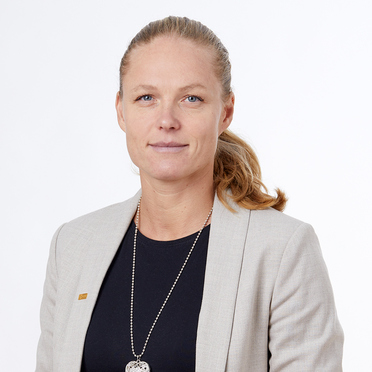The HPI group
The HPI group at GIH was formed in 2017 and is a research collaboration between GIH and HPI – the Health Profile Institute AB.

Aim of the HPI group
The group's aim is to generate knowledge about physical activity, performance, and other lifestyle habits in the Swedish working population based on an extensive, existing database of health profile assessments.
A health profile assessment provides information on physical activity, lifestyle habits, various health experiences, different body measurements, blood pressure, and fitness.
Health profile assessment is an interdisciplinary method used to develop employees' health at workplaces around Sweden. Since 1976, HPI has developed the technique of health profile assessments and trained health profile assessors to carry them out.
In 2022, close to one million health profile assessments carried out since 1987 will be available in the central database, approximately 46 percent of which are women. The database continues to grow, but about 30,000 new tests are completed each year.
Research questions
Some of the research questions we have or are in the process of answering
- How much of the working time do you sit, how often do you break your sitting position, and what significance does this have for measured and perceived health?
- How has the physical work situation changed over the past 30 years, and what significance does it have for measured and perceived health, as well as the incidence of cardiovascular disease and longevity?
- How has fitness in the working population changed over time?
- Can good fitness protect against ill health/disease/writing in occupational groups with physically demanding tasks?
- What should threshold values for fitness be used to identify the reduced risk of developing cardiovascular disease and increased longevity?
- How do fitness and physical activity level at a young age co-vary with a disease, relapse, and death from cancer later in life? Are any associations between fitness, physical activity, and health status in adulthood explained?
- How does a fitness and physical activity change between different measurements in adulthood co-vary with cancer incidence, relapse, and death? Are any relationships, such as the strength and direction of the relationships, affected by gender, age, and or socioeconomics?
- Can changes in fitness and or physical activity in different areas of life reduce the well-established, increased risk of obesity for cancer?
- How does physical activity level in adolescence co-vary with morbidity and mortality in cardiovascular disease? Are possible connections affected by physical activity patterns and fitness in adulthood?
- How do changes in physical activity patterns and fitness in adulthood co-vary with morbidity and mortality in cardiovascular disease?
- Do the physical activity pattern and fitness of individuals with cardiovascular disease change from pre- to post-disease?
- Can a change in physical activity pattern and fitness from before to after developing cardiovascular disease affect the risk of relapse and mortality?
- How do physical activity patterns and fitness in people with and without cardiovascular disease and hypertension co-vary with the risk of illness, ICU care, and death from covid-19?
- When and for whom is good fitness necessary for a lower risk of suffering from depression and dementia?
Focused themes
The research within the HPI group is mainly based on studies of physical activity, fitness, and other lifestyle habits and their development over time or connection with various health and disease outcomes.
The database size enables detailed analyses of variations between men and women, different ages, and occupational groups; particularly relevant are sub-analyses of female-dominated occupations that have previously been given less attention in more extensive studies.
Some of the themes that the research within the HPI group has focused on are presented below.
Thanks to the fact that the health profile assessments in the database have been collected since the 1980s, and continue to be collected, it enables unique trend analyzes over decades. So far, we have studied changes in fitness, BMI, active work commuting, perceived health, stress, loneliness, and sleep problems. Further analyzes will be carried out continuously.
Responsible researcher
Elin Ekblom Bak
Cardiovascular and metabolic health
Within the research group, we have used data from the health profile assessment to study the importance of, among other things, physical activity (sports education and physical activity during free time) at a young age for later metabolic health, but also the importance of fitness and BMI for future risk of cardiovascular disease. Specifically, analyzes have also been carried out within and between different professional groups. Further research within this theme is ongoing.
Responsible researcher
Elin Ekblom Bak
In 2022, the research group began research focusing on the importance of physical activity, fitness, and other lifestyle habits for illness and death from various forms of cancer in both men and women. Among other things, it is studied how a change in fitness and physical activity can affect the cancer risk, and when in life it can be of extra importance to have good fitness or be physically active.
Responsible researcher
Elin Ekblom Bak
In the health profile assessment, the participant estimates, among other things, experienced symptoms of anxiety and depression, data related to the amount of sitting during leisure time and at work. In addition, the relationship of fitness and physical activity with future depression outcomes and sick leave due to depression is studied, among other things. The latter is also part of the work of the E-PABS research group.
Responsible researcher
Elin Ekblom Bak
During the years 2020–2021, the health profile assessment was supplemented with specific survey questions regarding changes in physical activity and other lifestyle habits and perceived well-being in relation to the covid-19 pandemic. In addition, we have studied the importance of fitness for severe covid-19, such as hospitalization, intensive care, and death.
Responsible researcher
Elin Ekblom Bak
Research projects
The research within the HPI group takes place partly in limited research projects that have received funds from financiers but also based on interest and in collaboration with external researchers.
Below are some research projects that are ongoing or have been ongoing.
The aim is to study the importance of physical activity patterns and fitness, as well as changes in these, for illness, relapse, and death from cardiovascular disease in men and women of different ages. A further aim is to study the connection between physical activity patterns and fitness concerning illness, intensive care, and death in covid-19.
Responsible researcher
Elin Ekblom Bak
Project period
2021–2023
Research financier
Hjärt-Lungfonden
Act To Prevent - Fitness and physical activity in a lifelong perspective in the prevention of cancer
The aim is to study the importance of changes in fitness and physical activity during the life course to prevent different types of cancer in men and women of different ages from the Swedish working population.
The project aims to generate new and directly applicable clinical knowledge about whether changes in fitness and physical activity during different parts of life can affect the risk of contracting and dying from cancer. In addition, the goal is to identify risk groups to contribute to equal and good health in the population.
Responsible researcher
Elin Ekblom Bak
Project period
2022-2024
Research financier
Cancerfonden
The aim is to study the importance of sitting at work and in leisure time as well as fitness for perceived health and risk markers for metabolic ill health, as well as trends and importance of the physical work situation and fitness level for cardiovascular disease and life expectancy over 30 years, and how this varies between genders, age, education levels, and occupations. In addition, gender- and age-specific threshold values for fitness will be identified.
This project can generate knowledge for future health strategic decisions by both employers and politicians through recommendations to the individual worker, employer, and society. The large percentage of women is highly relevant, as women are historically understudied. Comparative analyzes within/between age, educational and occupational groups enable analyzes of variation in lifestyle and health from a diversity and equality perspective.
Responsible researcher
Elin Ekblom Bak
Project period
2019-2023
Research financier
FORTE
Hjärt-Lungfonden
Our researchers
At GIH
External and affiliated researchers
- Andreas Stenling, senior lecturer, Docent in Psychology, Umeå University
- Peter Wallin, Head of Research and Methodology, HPI Health Profile Institute
- Gunnar Andersson, PhD, responsible for research and method, HPI Health Profile Institute
- Sofia Paulsson, medical director, HPI Health Profile Institute
Financiers
- FORTE
- Hjärt-Lungfonden
- Cancerfonden
Collaborative partners
- HPI Health Profile Institute
Research subjects
- Idrottsvetenskap
- Folkhälsovetenskap
- Socialmedicin
- Epidemiologi
Publications
Here is a list of the publications from the HPI group at GIH, tagged in our publication database DiVA. The latest publications are first in the list.
- Article
Association between change in cardiorespiratory fitness and prostate cancer incidence and mortality in 57 652 Swedish men.
2024- Kate Bolam,
- Emil Bojsen-Møller,
- Peter Wallin,
- Article
Reference values for estimated VO2max by two submaximal cycle tests
2024- Daniel Väisänen,
- Björn Ekblom,
- Peter Wallin,
- Article
Maintaining or increasing cardiorespiratory fitness is associated with reduced hospital admission rate.
2024- Frida Griffin,
- Elin Ekblom Bak,
- Daniel Arvidsson,
- Article
Moderating effect of cardiorespiratory fitness on sickness absence in occupational groups with different physical workloads
2023- Daniel Väisänen,
- Peter J. Johansson,
- Lena Kallings,
- Article
Association Between Cardiorespiratory Fitness and Cancer Incidence and Cancer-Specific Mortality of Colon, Lung, and Prostate Cancer Among Swedish Men.
2023- Elin Ekblom Bak,
- Emil Bojsen-Møller,
- Peter Wallin,
- Article
Lifestyle-related habits and factors before and after cardiovascular diagnosis
2023- Amanda Lönn,
- Lena Kallings,
- Gunnar Andersson,
- Article
Unika hälsodata genererar flera värdefulla forskningsresultat
2022- Björn Ekblom,
- Gunnar Andersson
- Article
Combinations of BMI and cardiorespiratory fitness categories
2022- Erik Hemmingsson,
- Daniel Väisänen,
- Gunnar Andersson,
- Article
Cardiorespiratory fitness and lifestyle on severe COVID-19 risk in 279,455 adults
2021- Elin Ekblom Bak,
- Daniel Väisänen,
- Björn Ekblom,
- Article
Cardiorespiratory Fitness in Occupational Groups—Trends over 20 Years and Future Forecasts
2021- Daniel Väisänen,
- Lena Kallings,
- Gunnar Andersson,
- Article
Workplace sitting is associated with self-reported general health and back/neck pain
2021- Lena Kallings,
- Victoria Blom,
- Björn Ekblom,
- Article
Lifestyle Habits and Mental Health in Light of the Two COVID-19 Pandemic Waves in Sweden, 2020
2021- Victoria Blom,
- Amanda Lönn,
- Björn Ekblom,
- Article
Scaling VO2max to body size differences to evaluate associations to CVD incidence and all-cause mortality risk.
2021- Jane Salier Eriksson,
- Björn Ekblom,
- Gunnar Andersson,
- Article
Physical Activity, Sedentary Behavior, and Cardiorespiratory Fitness in Hazardous and Non-Hazardous Alcohol Consumers.
2021- Mats Hallgren,
- Davy Vancampfort,
- Thi-Thuy-Dung Nguyen,
- Article
Association between change in cardiorespiratory fitness and incident hypertension in Swedish adults.
2021- Tobias Holmlund,
- Björn Ekblom,
- Mats Börjesson,
Showing 1 - 15 of 27
On this page
Contact
 Professor, studierektor, högskolelektorElin Ekblom Bakelin.ekblombak@gih.se08-120 53 861
Professor, studierektor, högskolelektorElin Ekblom Bakelin.ekblombak@gih.se08-120 53 861

